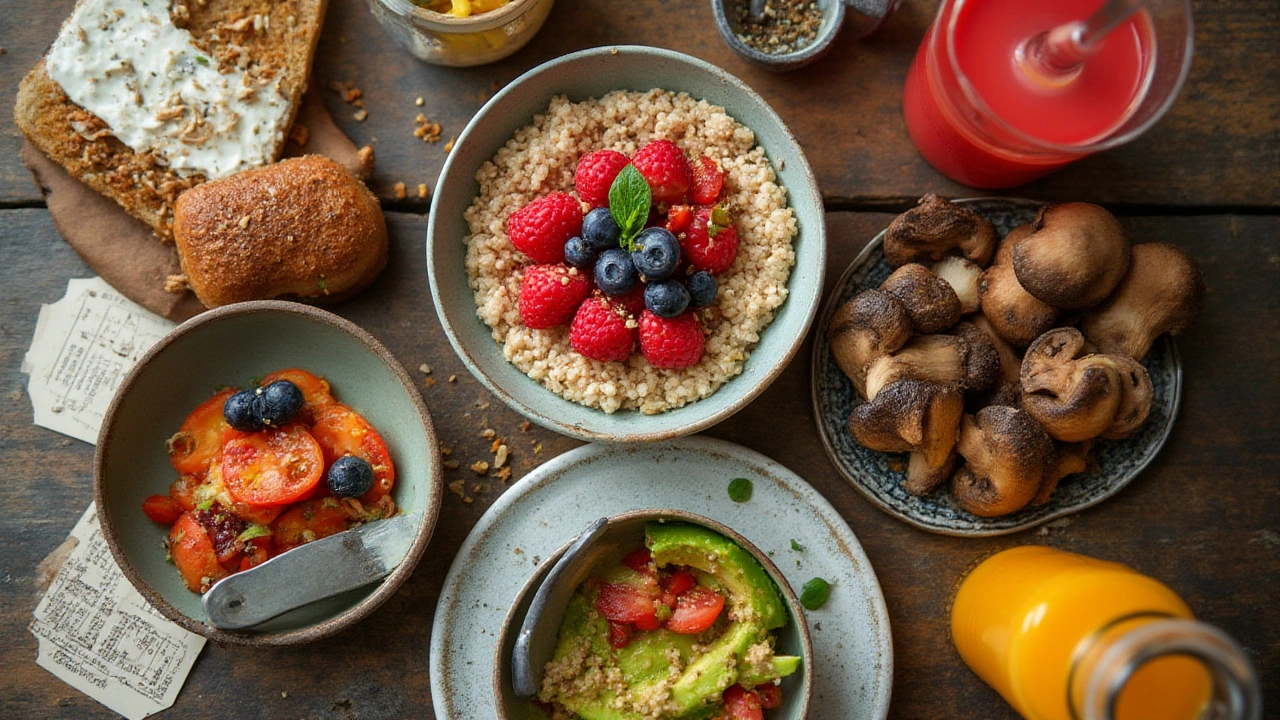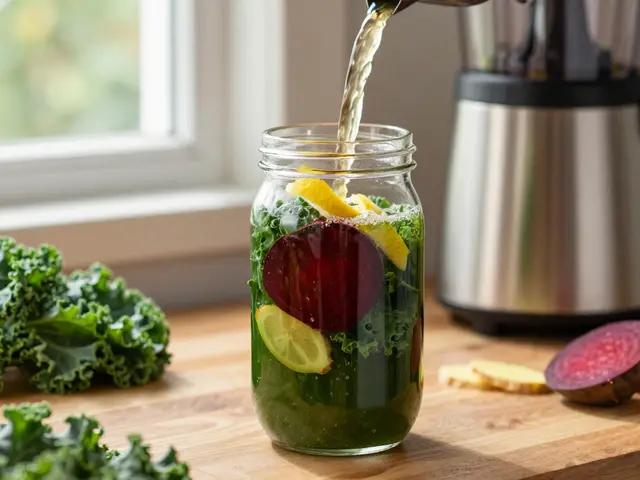
Think breakfast is just a formality? Think again. Skipping that first meal, or grabbing a sugar-laden pastry, is like starting your car with no gas—or worse, the wrong fuel altogether. Real talk: what you eat for breakfast sets the tone for how sharp, energized, and focused you’ll be by midday. The flip side is true, too. Go heavy on processed carbs, and you’ll be fighting the urge to nap before lunchtime. If you’ve been treating breakfast as an afterthought, you’ve been missing a simple, science-backed way to boost your mental and physical game every single day. Let’s take breakfast seriously, not just for the sake of some nutrition expert’s rules, but for what it can actually do for you—starting with better moods, more energy, and fewer mid-morning crashes.
Why Breakfast Matters More Than You Think
Most people have heard “breakfast is the most important meal of the day” at least a dozen times, but the reasons go way deeper than grandma’s advice. The facts are clear: your body’s blood sugar is lowest when you wake up. That means any carbs you eat first thing are processed differently than at other times. A study from the American Journal of Clinical Nutrition tracked adults who either ate breakfast or skipped it for twelve weeks. Those who ate breakfast made better food choices the rest of the day and had steadier blood sugar levels. Your brain, by the way, uses up to 20% of your daily energy just to function. Without a good breakfast, you’re basically running on empty before you’ve even made it to your desk.
Here’s something wild: eating a healthy breakfast actually helps your metabolism. The reason is called the “thermic effect of food,” which is just a fancy way of saying your body burns more calories breaking down real food, especially protein and complex carbs, than it does if you just run on coffee. Skipping breakfast can also backfire—people who miss breakfast tend to have cravings and snack more by noon than those who eat even a small meal early on. This isn’t just trivia for dietitians. Scientists at the University of Bath showed that breakfast eaters tend to move more during the day—so yes, eating early nudges you toward being more active.
Let’s not forget mental health. Ever feel like your mood tanks for no clear reason? That “hangry” feeling is real, caused by low blood glucose. A healthy breakfast with protein and slow-release carbs keeps your brain chemicals—like serotonin and dopamine—in better balance. One clever study from Cardiff University even found students who ate a high-fiber breakfast scored better on attention tests throughout the morning. So all those “top-performers eat breakfast” quotes? They’re not a myth.
Physical performance matters, too. If you work out, the right breakfast gives your muscles what they need to repair and rebuild. Good carbs give you energy, while protein helps ward off muscle breakdown. And if weight loss is on your radar, research from Mayo Clinic shows that people who eat a balanced breakfast are less likely to binge later on. It’s not about eating more; it’s about eating smart, right when your body actually wants it.
So, no matter what your goals—better focus, energy for your kids, crushing gym sessions, or just not snapping at your boss by 10:30 a.m.—breakfast matters. It doesn’t have to be complicated, costly, or time-consuming. It just needs to be intentional and made with real food.
What Makes a Breakfast ‘Healthy’: The Science-Backed Building Blocks
Forget the “healthy” label on the cereal box. Real breakfast health isn’t about marketing—it’s about three key things: balanced macronutrients, plenty of fiber, and avoiding ultra-processed sugar bombs. Let’s break that down. Macronutrients—protein, carbs, and fats—are all needed, but the ratio matters. Protein is the secret superstar: eggs, Greek yogurt, cottage cheese, or plant-based options like tofu or beans. Why? Protein keeps you full, helps rebuild muscles, and evens out sugar spikes.
Carbs should come from whole sources, not quick-fix white bread or sugary muffins. Think rolled oats, whole-grain toast, quinoa, or even potatoes. These release their energy slowly, which means no sugar rush, no crash, just steady fuel all morning. Fiber is the friend you didn’t know you needed—found in fruits, veggies, seeds like chia and flax, or nuts. As for fats, go for unsaturated sources: avocado, nuts, seeds, olive oil, or fatty fish. These support your brain, make you feel satisfied, and help you absorb vitamins.
Let’s talk mistakes. The number one breakfast disaster? Sugar bombs disguised as “healthy.” Instant oatmeal packs, flavored yogurts, granola bars—many are sneakily loaded with sugar, sometimes more than some sodas. Look at the label. If sugar is the first or second ingredient or there are double-digit grams per serving, your energy will spike, then crash. Avoiding big sugar at breakfast is one of the easiest ways to dodge the 11 a.m. zombie feeling.
Some folks think they need a giant meal, but studies show that quality beats quantity. A Scandinavian study compared those who ate massive traditional breakfasts—think sausages and cheese—with people who ate a smaller, nutrient-dense meal like eggs, fruit, and oats. The second group felt more focused and satisfied, with better blood sugar all day.
How much should you eat? Aim for somewhere between 300-500 calories, more if you’re very active. Each meal should ideally have: a palm of protein, a fist of carbs, two fingers of healthy fats, and as many veggies or berries as you want. Want it simpler? Combine three of the following: eggs, plain Greek yogurt, tofu, beans or lentils, oats, 100% whole-grain bread, berries or chopped fruit, nuts, seeds, and an extra—spinach, bell pepper, or tomato added raw or sautéed.
Bored of the same old stuff? Change it up. Breakfast doesn’t mean cereal and toast. Some of the healthiest countries—like Japan—eat savory breakfasts, such as rice, fish, and miso soup. The key is variety, with each component doing real work for your body and mind. Don’t obsess over the perfect ratio every day; just hit all the groups over the course of your week.

The Best Foods to Kickstart Your Morning
Let’s talk specifics—the foods that really shine at breakfast. Eggs top almost every nutritionist’s list for a reason. They deliver high-quality protein, B vitamins, healthy fats, and choline, which helps your brain fire on all cylinders. Multiple clinical trials show that an egg-based breakfast keeps you fuller three times longer than toast or cereal. Double win: they cook fast and can swing sweet or savory.
If you’re dairy-friendly, Greek yogurt gives a solid hit of protein, calcium, and gut-boosting probiotics. Pick the plain kind and dress it up with fruit and seeds—most flavored yogurts come with more sugar than a donut, which defeats the point. For non-dairy, try unsweetened soy or coconut yogurts fortified with protein.
Oats are the heavyweight champ for slow-burn carbs and soluble fiber, which not only supports digestion but helps lower cholesterol. You don’t even have to cook them—mix with milk (or a plant-based drink), fruit, and a few nuts, and you’ve got overnight oats ready to eat cold from the fridge. Can’t do oats? Cooked quinoa or amaranth makes a nutty, filling alternative that won’t spike your sugar.
Berries like blueberries, raspberries, and strawberries are little powerhouses. Just a half-cup gives you fiber, vitamin C, and antioxidants. These help your body fight daily cell stress—think anti-aging, better immunity, and steadier energy to power through Zoom calls or playground duty.
Let’s not skip healthy fats. A slice of avocado on toast brings fiber and unsaturated fats that boost absorption of fat-soluble vitamins like A, D, E, and K. Nuts or nut butter (look for just nuts, not sugar-laden spreads) deliver more protein, crunch, and satisfaction. A tablespoon of peanut or almond butter on whole-grain toast loads your meal with flavor and function.
Vegetables for breakfast? Absolutely. Spinach, kale, peppers, tomatoes—toss them in eggs, smoothies, or pile onto toast. Starting the day with veggies means you’re already halfway to your daily goal by 9 a.m. People who eat more veggies at breakfast tend to snack less on sweets later, thanks to the filling combo of fiber and micronutrients.
Want something quick? Blend up a protein smoothie. Use a scoop of protein powder, milk or unsweetened almond milk, frozen berries, a handful of spinach, and a tablespoon of chia seeds. This ticks all the boxes: carbs, protein, fiber, and healthy fat. Add some oats for a thicker shake or swap fruit if you want less sugar.
Time for a reality check: breakfast bars and pastries (even the “natural” ones) are often packed with sugar and low in fiber. Swap for a banana with nut butter or a boiled egg and fruit for a portable option that actually does your body some good.
The key to using these foods? Mix and match based on what you like, need, and have time for. The best healthy breakfast is the one you’ll actually eat. Busy morning? Boil eggs ahead of time, portion nuts into snack bags, prep oats overnight, or make a smoothie you can take to go. When you build a habit of choosing whole, minimally processed foods, you’ll notice the difference in your energy, focus, and even your mood before the week’s up.
Easy Recipes and Tips for Making Healthy Breakfasts Stick
Time is the enemy for breakfast. Most people say they’d eat better if they had an extra half hour—but you don’t need it. The trick is to prep, think portable, and keep a few go-to recipes on hand so you’re never caught staring blankly into the fridge. Here are some ideas for every kind of morning, plus tips to level up your breakfast game without stress.
- Protein-Packed Overnight Oats: Mix ½ cup old-fashioned oats, ½ cup Greek yogurt, ½ cup milk of choice, 1 tablespoon chia seeds, a handful of berries, and a dash of cinnamon. Leave in a jar overnight. Eat straight from the fridge.
- Veggie Egg Muffins: Whisk 6 eggs with a splash of milk, chopped spinach, peppers, and a sprinkle of cheese. Pour into muffin tins and bake at 375°F for 15-20 minutes. They keep in the fridge for a week and taste great cold or heated.
- Quick Berry Yogurt Bowl: Layer plain Greek yogurt with mixed berries, a spoonful of nut butter, and a sprinkle of pumpkin seeds or granola. It checks all the boxes for protein, fiber, and healthy fat.
- Avocado Toast 2.0: Smash half an avocado on a piece of whole-grain toast, top with sliced tomato, a boiled egg, and a sprinkle of chili flakes or hemp seeds for an extra nutrient punch.
- Banana Pancakes: Mash one ripe banana with two eggs. Cook like regular pancakes. Serve with a scoop of almond butter and a few berries. Perfect for kids and adults.
- Breakfast Smoothie: Blend one scoop protein powder, half a banana, ½ cup frozen berries, a tablespoon of peanut butter, a handful of spinach, and one cup oat milk. Pour and go.
Want to eat healthier with zero extra effort? Set up little systems. On Sunday, boil half a dozen eggs, wash some berries, portion trail mix into small containers, and stash overnight oats in the fridge. Keep plain yogurt, eggs, fruit, and a loaf of quality bread on your regular shopping list so you’re stocked up by default.
If you’re not a morning person, snap your breakfast components together the night before. If routines shift (maybe you work out before breakfast, or eat with your kids at different times), keep healthy “grab and go” options ready—pre-packed containers, snack baggies of nuts, whole fruit, or frozen smoothie cubes.
If you need variety, rotate recipes each week. If weight loss or energy is your goal, stick with staples that check all the macro boxes—protein, carbs, healthy fats, and fiber. Pay attention to how you feel after different breakfasts and adjust. Some people thrive on oats and eggs; others feel best with yogurt, fruit, and seeds. There’s no perfect breakfast for everyone—just the one that fits your body and your life.
Above all, keep it real. Breakfast shouldn’t be a chore or a bland plate you force down for the sake of health. Use spices, sauces, fresh toppings, and colorful fruit. Enjoy it sitting down if you can. Your morning meal isn’t just fuel—it's a daily shot at feeling, performing, and living better.





